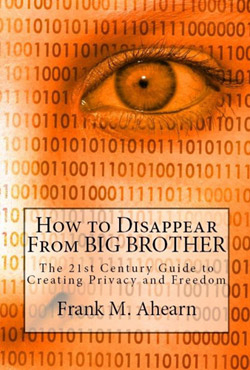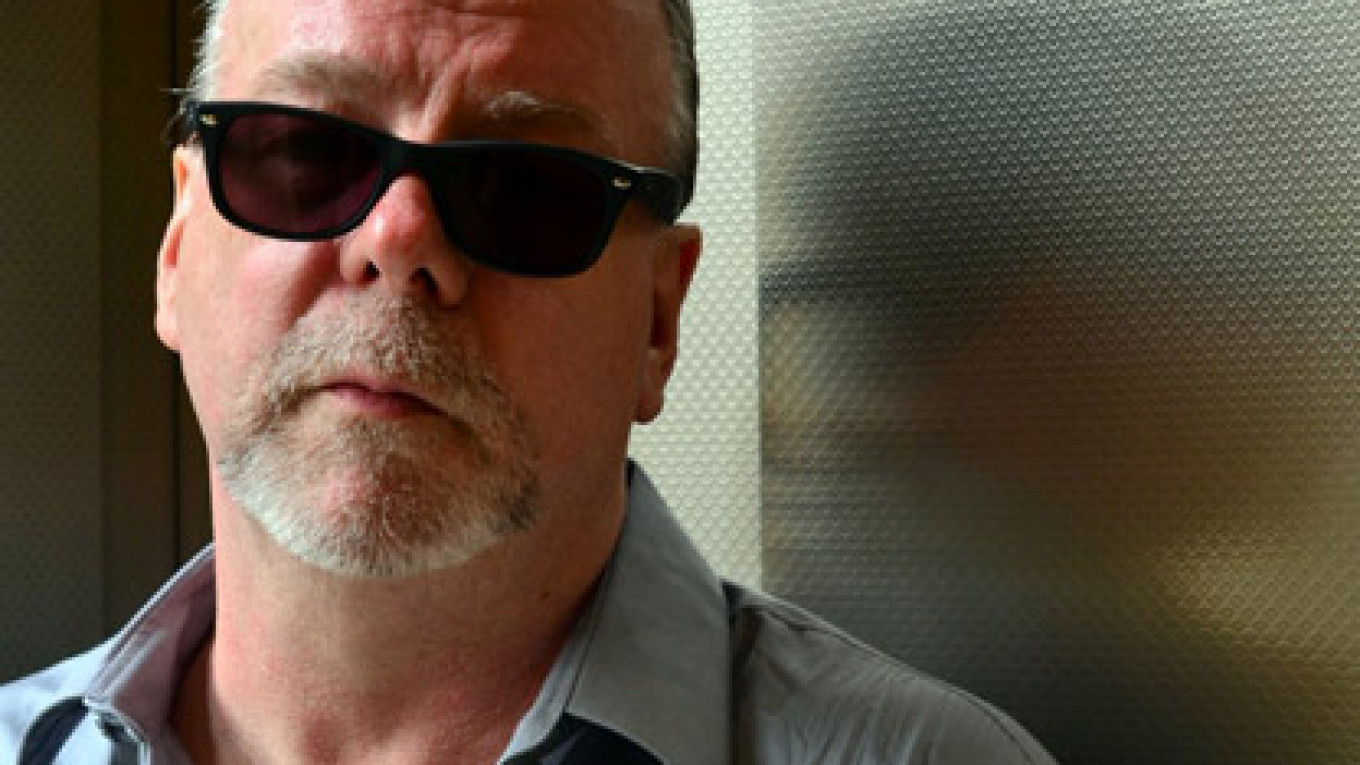Ever wanted to just vanish, to abandon everything and start your life from scratch? Well, there is a man who can make that happen — though he charges eight times the average annual salary in Russia.
Since 2001, the New York-born Frank Ahearn has been making a living helping people who need to disappear or conceal some part of their lives — a pretty tall order in a globalized, digitalized world.
Frank Ahearn
Birthplace: New York City
Age: 52
Education: "School and I did not mix well, I left when I was 15."
Work Experience
1984: Began skip tracing (locating people) in 1984 (aged 22).
2001: Began the disappearing work (aged 39).
2014: "How to Disappear," written by Ahearn and Eileen Horan, makes The New York Times' best-seller list.
Favorites
Movie: "Once Were Warriors" (1994)
Books: Fyodor Dostoevsky's "Notes From the Underground," or Raymond Radiguet's "The Devil in the Flesh." ("I am a huge fan of Russian and French literature.")
Favorite restaurant: Any place without tourists and where no suit is required.
Favorite place: Any cafe in the Saint-Michel neighborhood, Paris
The list includes plenty of Russian clients, said Ahearn, who describes himself as "a privacy expert who disappears people who have extreme privacy needs."
The description may evoke visions of mobsters dreaming of a peaceful retirement or accountants on the run with corporate fortunes, but Ahearn insists his job is not to aid and abet criminals.
There are plenty of people interested in "skip making" — as the disappearing act is called — for legitimate reasons, including stalking victims and rich people who want privacy for their families.
And the job is not easy to pull off in a modern country, including Russia, where the state-of-the-art electronic surveillance system SORM-3 is being introduced to outcry from privacy defenders, who say the system is so all-encompassing and free of public control that it would make Edward Snowden's blood run cold.
In an interview with The Moscow Times, Ahearn avoided speaking about the chances of taking on the state-run SORM-3, but said he has a lot to offer private individuals.
Ahearn attributes his professional success to the "fine art of lying," but maintains he works exclusively on the right side of the law. He says he quit his earlier job as a "skip tracer" for British tabloids when new legislation began to shrink the legal operating arena for that, edging practitioners ever closer to lawbreaking.
Now he charges a minimum of 40,000 euros ($50,000) per disappearance, and his book, "How to Disappear," co-written with Eileen Horan, scaled the lower reaches of The New York Times best-seller list in September.
Only a fraction of the people who think they need "skip making" really do, Ahearn said. The Moscow Times spoke to him about those people, his business in Russia, ways of obtaining phone and credit card records, and why he should be trusted at all.
What is your modus operandi?
I search for all online and offline information about my client. The information I can delete, I delete, if I cannot, I try to deviate the information, change Frank to Hank. I utilize offline and online social media to create misinformation to make it appear my client disappeared to Minsk but in reality is in St. Petersburg. I teach my client how to become a virtual entity and exist with no connections to anything physical.
How many clients do you have, and what countries do they come from?
The majority of my work comes from Europe, and the top countries at present are Germany, Switzerland, Russia and Italy.
How many are from Russia and the former U.S.S.R., and what kind of people apply to you from this region?
I have worked with about 10 Russian clients in the past two years. All of them are extremely wealthy and were interested in creating extreme privacy measures or creating disinformation that combats negative information about them.
What kinds of problems do your Russian/ex-U.S.S.R. clients tend to have?
I would say privacy is No. 1. The new breed of wealth combined with online information has made the wealthy and their families potential targets in abduction and financial scams.

A New York Times best-seller.
Someone who is worth 10 billion euros does not want their child connected to them on the Internet. Therefore, with select clients I make sure that no one can ever connect the family to the billionaire, be it via Facebook or other social media. For example, if the client's son is named Alexey Eremenko, I will build hundreds of online profiles using that name. This way, the client's son's information is buried between 200 Alexey Eremenkos who live in all parts of the world.
Are there any aspects of your work specific to your Russia-related operations, compared with the rest of the world? Is anything harder to pull off, or easier?
There is nothing harder to pull off with Russian clients. The work and methods are usually similar. Getting Russian business clients to trust me is always the challenge. My methods of solution are at times bizarre and sometimes bold, and trust me, [they are] not an easy sell. I dislike wearing suits, I have long hair and a goatee, I always wear my sunglasses and I specialize in deception.
What kind of Russia-related job would you never take on (e.g. hiding someone from the security services, or helping the mafia or Islamists)?
I would never work with someone who has murdered his wife and is now in hiding. Nor would I ever work with a group looking to inflict harm on a culture or society. However, some wealthy clients may have done questionable things in "Country A" but it is not against the law in "Country B." I make sure that "Country A" does not send someone to abduct them.
How much do you charge the Russians you work with?
It depends on the work. It usually starts in the range of 40,000 euros and can reach about 100,000 euros.
Can you give any particularly colorful examples of Russia-related jobs/clients (no names, of course)?
If anything, I would say the Russian clients have been the most exciting, and at times [it] seemed like a spy novel. One such client is extremely concerned about his privacy, and his primary concern is keeping his wife and children's identity a secret. I never know when he is going to contact me and I will get a call to be in Paris the next day and check into "X hotel." In the hotel are laptops, prepaid phones and other tools. He then provides me with three or four translators, and I teach them how to create online deception to protect his whereabouts, the schools his children go to and his wife's information. When we are finished he sends a lawyer of his to the hotel suite and we destroy the laptop and cell phones by soaking them in a certain type of liquid.
Or a different case. Without my client's knowledge, his son went to an African country and bribed his way to a minister's office. His plan was to undercut "Company X," which provided the same service as his father's company. This $300 million contract provides services for the public.
What the son did not know was that the minister he was trying to bribe was taking bribes from "Company X." In addition, his father and the owner of "Company X" were bitter rivals. The son left the country right before the police came to arrest him for bribery.
One night in Ibiza, the son was at a restaurant when several men began threatening him but avoided a fight. A few weeks later in Belgrade, the same situation happened and nearly became physical. A few weeks later in a different city the same thing happened, and one of the men involved was from the Ibiza confrontation. It was obvious the son was being stalked.
My job was to figure out how the predators were able to locate the son in different cities. My first action was to look into how his travel was booked, but I was unable to locate any breach. I then figured out that one of the son's friends who traveled with him posted on Instagram and Twitter. He posted photos where they were hanging out and such.
After taking down the social posting of the traveling, things got quiet. However, a few weeks later, the son was physically attacked in a different city. The client knew "Mr. X" all too well and knew this attack was only the start of the troubles. I disappeared the son, and he will never be located.
How many people who want to disappear really need to? Do they disappear forever if they do?
I would say only a small number. Sometimes people believe that disappearing will solve all their problems, but that is not true. I try to work with clients to solve their problems and only disappear [them] if there is no other resolution.
For some people who are the victim of stalkers or other forms of violence, I suggest they consider disappearing forever or until their predator no longer lives.
Your job deals a lot with stalkers who use the credit card or phone information of the people they are stalking. How do they access this information?
Good question. In society today, people tend to view privacy and information as an online issue. I say privacy goes beyond the computer screen.
When hunting down a person you always look for the information they left behind. Credit card charges, airline records and phone records.
Phone records are a big downfall for people seeking privacy or disappearing. The problem is they have already created a footprint before realizing they want or need to disappear. They may have used their phone to call a real estate broker in Nice, a lawyer in Belgrade or hotel in Belize.
Obtaining and extracting information can be rather easy for a social engineer such as myself. Most countries have maybe 10 major mobile carriers, 15 major utility carriers and 15 major cable TV carriers.
If someone hired me to find a person in Russia, I would locate a college student and instruct them to call every one of the phone, utility and cable TV companies and pose as you. He would explain that he had an alcohol problem and may owe money on an old account. Once we located the companies where you had accounts, I would call and ask to speak with an English-speaking person if they have one. I would explain that I am being audited and need copies of my phone records. Some companies will fax copies of the records, others will read off each phone call you made on every bill. All you need to do is ask!
If I wanted to know where you have traveled to, I would contact every airline and pose as you, asking for a history of my frequent flier account. If you have one, I will easily obtain your travel history.
From there I would know what cities you have traveled to and I would contact the hotels that would be in your financial bracket. I would simply call and say, "Hello, I stayed in your hotel but lost my bill, can we take a few minutes and go over the charges." Not everyone will provide me with the information I request, but I keep calling until I locate the person who will provide me with the information. When I have that person, I ask for a copy of calls made from the hotel room and request they fax over my IP history. The fax is a public fax machine, and I pay a college student to pick up the fax and fax it to another location.
These are simple examples, but this is how information is extracted. The fine art of lying!
You mention that you employ other people — lawyers, students to make calls. In general, how many minions do you use, and in what capacity?
I do not employ them as employees, but I utilize them when there is a language barrier, and rarely use the same person twice. I need to make sure they never know what type of work I am doing, therefore when I locate someone I use a service like Odesk.com, which is a third-party outsourcing company. I never contact them as Frank M. Ahearn. I utilize an alias from a consulting company and request they do temporary work.
Has anyone ever tried to use you to get to your clients?
I have been contacted by people who think I disappeared their husband or something but nothing beyond that.
What do you enjoy most in this line of work? And least?
The traveling and meeting clients is the best part of my business. They are fascinating people who live amazing lives, and I get to step into that life for a short period and it is cool.
I do not like it when lawyers get involved. They tend to think too conservatively and are afraid to take chances when it comes to resolving issues.
Your work is reminiscent of Winston "The Wolf" Wolfe, the "cleaner" character from the movie "Pulp Fiction," in that both you and actor Harvey Keitel's character do, in essence, simple things to achieve extraordinary results in privacy-related situations. How do you feel about the comparison — are there any other fictional characters with whom you feel an affinity?
I see myself as a specialist or a hired gun who enters a situation to resolve what appears to be unresolvable. I do not find what I do all that extraordinary, I just do what I do and make sure it is done to the best of my abilities. Unlike Mr. Wolfe, I avoid dead bodies and hitmen.
You said this business will not last forever. Why?
When I am involved in the work, it consumes me. I live and breathe that piece of work. Did I do this right, did I leave a footprint here, what if this, what if that, etc. — it takes its toll on the mind.
I want to write books for a living and open a bookstore/cafe in Lisbon or Paris.
If you're so good at lying, how can we believe you when you say you can pull off this disappearing act?
It is like falling in love: You have to take a chance. … I have spent a lifetime hunting people all over the world. My primary expertise is hunting and deceiving people. I know what predators search for when they are in the hunt, and I know the deception I need to create to keep my client safe.
Contact the author at a.eremenko@imedia.ru
A Message from The Moscow Times:
Dear readers,
We are facing unprecedented challenges. Russia's Prosecutor General's Office has designated The Moscow Times as an "undesirable" organization, criminalizing our work and putting our staff at risk of prosecution. This follows our earlier unjust labeling as a "foreign agent."
These actions are direct attempts to silence independent journalism in Russia. The authorities claim our work "discredits the decisions of the Russian leadership." We see things differently: we strive to provide accurate, unbiased reporting on Russia.
We, the journalists of The Moscow Times, refuse to be silenced. But to continue our work, we need your help.
Your support, no matter how small, makes a world of difference. If you can, please support us monthly starting from just $2. It's quick to set up, and every contribution makes a significant impact.
By supporting The Moscow Times, you're defending open, independent journalism in the face of repression. Thank you for standing with us.
Remind me later.







